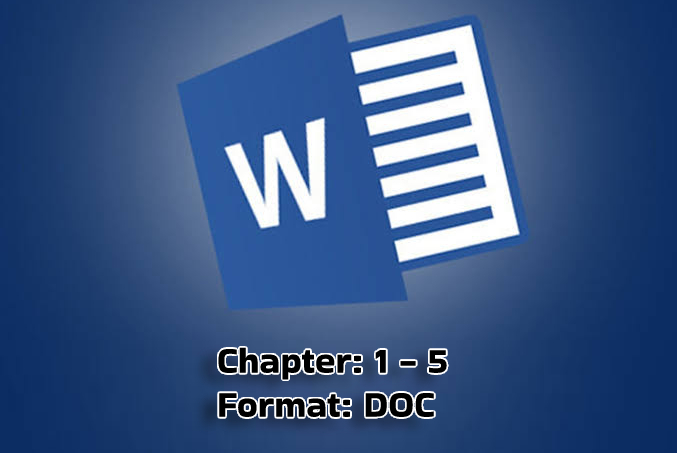Description
ACKNOWLEDGEMENT
I wish to express my profound gratitude, to my supervisor, —
who patiently gave me a series of direction in this write up. Also to my
Head of department —.
My profound gratitude also goes to my caring and loving parents –
— who have invested all they have both spiritually, financially, and
otherwise with joy to make me somebody. God will never forget your
labour of love. Also to my precious and caring — for their maximum
support in all ramification.
I will never forget my very special friends who have really been a
source of inspiration in my life. Christian Eyaba, Joy Egonu, Blessing
Ozonevo, Gadafi, Lovette, Leon and host of others.
I most not forget ones — who have been a source of
encouragement and have contributed immensely, both spiritual moral
and financial support throughout my stay in school. My special thanks
goes to God Almighty for guidance and protection throughout the
duration of this programme.
PROPOSAL
This project is aimed at finding out the role of an accountant in
the poverty eradication programme of the federal government with
particular reference to Enugu North, local government, area.
The method of obtaining data for this research, will be mainly
from primary sources such as personal interview, questionnaires and
observations and secondary sources such as literature review,
newspaper, magazines and journals etc.
This project will also look into the failure of the previous writer to
determine the role of an accountant, in the poverty eradication
programme of the federal government. Besides this research may not be
termed comprehensive due to limitations imposed by: financial,
constraint, time constraint, Unavailability, of necessary materials etc.
However, at the end of the study I determine to find out whether
the role of and accountant is of any relevance in the planning
programme and policies of poverty eradication in Enugu North local
government secondly, I will determine whether the role of the
accountant is of any relevance chim monitoring of he strategies of the
poverty, eradication programme of Enugu North L.G.A .
Thirdly, I will determine whether the role of the accountant will
result in the actualization of the objectives of poverty eradication,
programme in Enugu North L.G.A
TABLE OFCONTENT
COVER PAGE
TITLE PAGE
APPROVAL PAGE
DEDICATION
ACKNOLWEDGEMENT
ABSTRACT
CHAPTER ONE
INTRODUCTION
1.1 BACKGROUND OF THE STUDY
1.2 STATEMENT OF THE STUDY
1.3 OBJECTIVE OF THE STUDY
1.4 FORMULATION OF HYPOTHESIS
1.5 SCOPE AND DELIMITATION OF THE STUDY
1.6 SIGNIFICANCE OF HTESTUDY
1.7 LIMITATION OF THE STUDY
1.8 DEFINITION OF TERMS
CHAPTER TWO
REVIEW OFRELATED LITERATURE
2.1 NATURE AND SCOPE OF ACCOUNTING
2.2 QUALIFICATION OF AN ACCOUNTING
2.3 QUALIFICAITON OF ACCOUNTING AND CONTROL
2.4 THE FUNCITONAL ROLE OF AN ACCOUNTING
2.5 UNDERSTANDING PRACTICAL AUDITING AND
INVESTMENT
2.6 THE POVERTY ERADICATION PROGRAMME OF THE
FEDERAL GOVERNMENT
REFERENCE
CHAPTER THREE
RESEARCH METHODOLOGY
1.1 SOURCE OF DATA
1.2 RESEARCH ISNTRUMENT
1.3 POPULATION OF STUDY
1.4 SAMPLE TECHNIQUE
1.5 DETERMINATION OF SAMPLE SIZE
1.6 VALIDATION OF ISNTRUMENT
1.7 METHOD OF QUESTIONNAIRE DISTRIBUTION
1.8 TEST STATISTICS
CHAPTER FOUR
DATA PRESENTAITON ANALYSIS AND
INTERPRETATION
4.1 DATA PRESENTATION ANALYSIS AND INTERPREATION
4.2 TEST OF HYPOTHESIS
CHAPTER FIVE
5.1 SUMMARY OF FINDINGS
5.2 CONCLUSIONS
5.3 RECOMMENDATIONS
5.4 SUGGESTION FOR FURTHER STUDIES
APPENDIX I
APPENDIX II
BIBLIOGRAPHY
CHAPTER ONE
1.0 INTRODUCTION
The need to develop micro economic activities that could enhance
self-reliance as a strategy for reducing poverty becomes so pronounced
that the three arms of government (Federal, state and local government)
come up with various initiatives. Among these were programs and
policies that aimed at:
– Stimulating economics growth through the engagement, of semi-
skilled and unskilled labour in production activities
– Immediate reduction of social vices and tension in the society by
removing idle handle from the streets
– Engage the unemployed indirect activities as a veritable means of
re-floating the economy.
– Improve of the environmental degradation
– Minimize rural or urban drift through the improvement of rural
communities
– Committing the fund to direct benefit of the participant rather
than on service or overheads
– To achieve these more machinery, accountability, honesty must
be put in motion with competent, professional from various field
of endeavour rammes, and policies.
1.1 BACKGROUND OF THE STUDY
Among the major problems that have plagued the socio-political
and economic life of developing nations are gross unemployment of her
learning population and poverty. Among these nations includes our
country Nigeria. Poverty is pervasive. About 60% of Nigeria live
below the poverty line. Available statistics shows that only fifty percent
of the population, have access to safe water. About thirty-eight percent
of the population do not have access to primary health care whole most
Nigeria, consume less than one third of the minimum required protein
and vitamins in-take due to low purchasing power.
These incidence were compounded by over two decades of
political instability, macro economic, policy inconsistencies low
capacity utilization, in industries and the massive turn out of school
leavers and graduates by institution of higher learning.
This is to say that despite these, for three decades after
independence, unemployment and poverty, were not a national, state or
local concern in Nigeria as it is today.
However, on inception of office in May, 1999, the Obasanjo
administration tool upon itself the major task of redressing the twin
problem of poverty ad employment generation therefore, the
government with a high sense of commitment earmarked the sum of
N100 billion for the creation of 200,000 jobs in the year, Government
desire to eradicate poverty was born out of the conviction that the
incidence of poverty and unemployment have assumed wider dimension
that is socially economically and political unacceptable.. To this end
therefore, all hands must be deck including not only the three tiers of
government but also professional, bodies and competent individuals
among these includes the roles of he accountant.
Poverty is also one of he most serious problems, confronting
Nigeria today. It is generally associated, with conditions under which
people lives. It is usually defined in either absolute or relative terms.
Absolute poverty denotes a condition in which person or group of
people are unable to satisfy their most basic and elementary requirement
of human survival in terms of good nutrient, clothing shelter, footwear,
energy transport, health education and recreation. It is generally
believed that absolute poverty can be eradicated and that is the target
aimed in this blue print.
Statistical data available indicate that b.
Statistical data available indicate that by 1960 the poverty level in
Nigeria cover about 15% of the population and by 1980. It grew to
twenty eight percent and later increased to forty-three percent in 1992.
By 1996 the federal office of statistics estimated the poverty level in
Nigeria at about sixty-six percent. According to the united nations
report (1999), Nigerians Human development index (H.DI) was only
0.416 which places the country among the twenty-five poorest nation in
hoopla. Furthermore, Nigerians literacy rate was forty four percent and
seventy percent of the rural population do not have access to potable
water, health care facilities and electricity. This national poverty
eradication porogrmme (NPTP), provides strategies, for the eradication
of absolute poverty in Nigeria, through the streamlining and
rationalization, of existing poverty alleviation institutions and co-
ordinated implementation and monitoring or relevant schemes and
programmes tall levels as of government.
In view of the fact that poverty in Nigeria is widespread and
multi-dimensional the federal government seeks to ensure that all
activities and programmes of the line ministries and agencies are
effectively co-ordinated. In addition, government also seeks to ensure
policy continuity, existence of appropriate institutional, framework and
sustainability of all the programmes.

